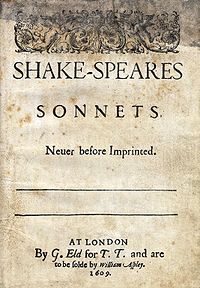PART ONE
Most believers in William Shakspere of Stratford as the author known as “Shakespeare,” along with those who conclude he was Edward de Vere, seventeenth Earl of Oxford, understand that the poems, plays and sonnets are filled with sexual innuendo, that is, double entendres or language with two meanings. Members of both camps agree that “Shakespeare” the man was probably bisexual, although the term was then unknown.
In addition, Shakespeare lovers generally recognize that the Sonnets as printed in 1609 come closest to revealing the author’s person and why, as he confesses, “My name be buried where my body is, and live no more to shame nor me nor you” (72). Many Oxfordians realize that once we discover how the Sonnets use the language of romantic and erotic love to preserve a more important story, the Stratfordian myth will automatically be shattered.
When J. Thomas Looney presented evidence in 1920 that “Shakespeare” was the Lord Great Chamberlain of England, close to the absolute monarch and her powerful chief minister, he stood the traditional image of the author on its head. In a single breath he identified the poet-dramatist as the antithesis of a commoner and confirmed that the “authorship question” is inextricably bound up with Elizabethan court politics and royal government.
Whatever the circumstances that caused Oxford to agree with the posthumous burial of his identity, they are alive within this very same sonnet sequence, which seeks to ensure the eternal fame of Henry Wriothesley, third Earl of Southampton:
‘Gainst death and all oblivious enmity
Shall you pace forth; your praise shall still find room
Even in the eyes of all posterity
That wear this world out to the ending doom. (55)
Your name from hence immortal life shall have,
Though I (once gone) to all the world must die. (81)
And thou in this shalt find thy monument,
When tryants’ crests and tombs of brass are spent. (107)
In that couplet of Sonnet 107 he is glancing at the recently deceased Queen, whose body is set to be borne on 28 April 1603 to Westminster Abbey, where her coffin will rest in the shadow of the great brass tomb of her grandfather, Henry VII of England. And yes, Oxford is saying that Elizabeth Tudor was a tyrant.
“If we suppose that ‘Shakespeare,’ whoever he may have been, retained in 1603 the feelings he had expressed for Southampton in 1593 and 1594,” Looney argues, “it is impossible to think of him writing panegyrics on Queen Elizabeth whilst his friend was being kept in prison … Oxford’s experience as a whole [would] indispose him to join in any chorus of lamentation or of praise.”
Looney agrees that 107 celebrates Southampton’s release from the Tower by King James on 10 April, following the Queen’s death on 24 March and the unexpectedly peaceful succession. He also proposes that 125 is “the Earl of Oxford’s expression of his private feelings relative to Queen Elizabeth’s funeral” and “may be taken as his last sonnet” (given that 126 is the envoi of the series). In other words, the schoolmaster recognized that 107 and 125 each express Oxford’s glaringly opposite attitudes toward Southampton and Elizabeth. He refers, for example, to these lines of 125:
Have I not seen dwellers on form and favor
Lose all and more by paying too much rent
For compound sweet forgoing simple savor,
Pitiful thrivers, in their gazing spent? (125)
This sentiment is “strongly suggestive of an allusion to royalty,” Looney writes, “and is exactly descriptive of what Oxford represents Elizabeth’s treatment of himself to have been.”
No such links to the royal court trouble Stratfordian leaders, however; only one thing frightens them, consciously or otherwise: the prospect of Oxfordians demonstrating that the sonnet sequence of 1609 contains a story that is both cohesive and based on specific events in the life of Edward de Vere, Henry Wriothesley and the Queen of England.
Over the past century since “Shakespeare” Identified was published, however, they have been confident (again, knowingly or not) that no such demonstration will appear. They have no problem with Looney’s statement that the Sonnets “reflect at once the soul and the circumstances” of the Earl of Oxford – no problem, just so long as such reflections appear to remain free of any overall coherent narrative linked to the contemporary history.
The goal of this Stratfordian game is to be able to keep on playing it.
Nor are they bothered that Oxford undoubtedly led a lusty sexual life, with both male and female partners, while trying to pull England out of the Dark Ages into the bright freedoms of the waning European renaissance. Most Oxfordians agree the Sonnets are drenched in the language of eroticism and bisexuality; but even that is no cause for Stratfordians to worry, so long as no true story within the 1609 sonnet sequence – one based on the record of actual persons, situations and events – comes to the surface.
If Oxford was bisexual, which the evidence suggests he was, Stratfordians can say the same about their champion – because, after all, the biographical fantasy of William Shakspere as “Shakespeare” allows for anything. So long as neither side discerns a coherent narrative in those deeply personal sonnets, it’s a draw; and the title, according to custom and convention, stays with the reigning champ.
The chieftains of tradition will continue to prevail, despite overwhelming evidence of Oxford’s authorship, so long as the 1609 sequence remains an unfathomable free-for-all. They will prevail because the 154 consecutively numbered sonnets – so profoundly autobiographical, so obviously arranged in order with careful connectivity – are still viewed (by Stratfordians and possibly by most Oxfordians) as loosely related little poems that can be rearranged at will and, therefore, remain supposedly ripe for any interpretation at all.
The unspoken Stratfordian fear of a real-life Oxfordian story within the Sonnets, one supported by a genuine historical context, nonetheless persists; and the latest demonstration of this underlying dread is now upon us, in the form of a new book by Sir Stanley Wells and Dr. Paul Edmondson. This latest blast from the Shakespeare Birthplace Trust represents what may be the most direct assault on the cohesion of the Sonnets ever launched. Here, finally, is a frontal attempt to completely shatter the integrity of the numerical sequence and, thereby, remove any possible semblance of a recorded story.
Welcome to All the Sonnets of Shakespeare, which includes additional poetry from the plays, adding up to 182 verses arranged according to the chronological order in which the authors believe they were written. “We’ve removed the story which has plagued the sonnets for centuries about the so-called Fair Youth and the Dark Lady,” Edmondson told BBC Radio, “because it was never there. It was an eighteenth-century invention.” This new arrangement of the sonnets “in their probable order of composition” now “exposes them as free poems laden with Shakespeare’s personality.”
Free poems!
Stephen Greenblatt, who has admitted that his Will in the World was not a genuine “life” of Shakespeare but, rather, a historical novel, praises Wells and Edmondson for “jettisoning the order in which the sonnets appeared in print” because the result is “radical and unsettling.” The creators of this newly invented arrangement may imagine they have finally removed the specter of an Oxfordian story from the 1609 sequence; as the blurb from Greenblatt suggests, they will be applauding themselves for appearing to have slain that lurking dragon.
But Oxford’s more important true story is not going anywhere. It continues to exist right there, forever embedded within the familiar costume of the romantic and erotic poetical language, and one day it will be widely recognized as “the living record” (55) of Southampton preserved within a “monument” (81, 107) of verse for posterity – that is, for us.
(PART TWO will be posted next week.)


























 Is Shakespeare Dead? is a monologue adaptation of Mark Twain’s hilarious 1909 debunking of the myth that William Shakespeare wrote the works of Shakespeare. Listing the handful of established facts of Shakespeare’s life, Twain ridicules the fantasy that an uneducated youth could have wandered into London and, with virtually none of the necessary skills, became the greatest author in English literature.
Is Shakespeare Dead? is a monologue adaptation of Mark Twain’s hilarious 1909 debunking of the myth that William Shakespeare wrote the works of Shakespeare. Listing the handful of established facts of Shakespeare’s life, Twain ridicules the fantasy that an uneducated youth could have wandered into London and, with virtually none of the necessary skills, became the greatest author in English literature.